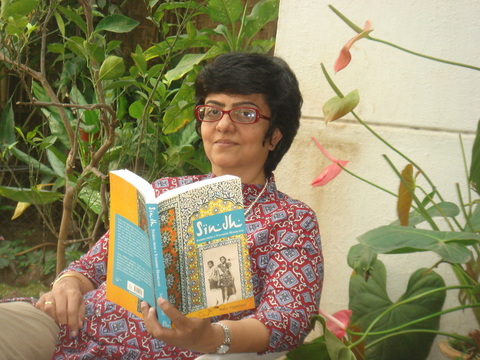
‘I realized that for the children who had left Sindh with their parents, the abrupt excision and denial had made their childhood home a place that lived only in their memories’ – An interview with Saaz Aggarwal
[Saaz Aggarwal is an independent researcher, writer and artist based in Pune, India. Her body of writing includes biographies, translations, critical reviews and humor columns. Her books are in university libraries around the world, and much of her research contribution in the field of Sindh studies is easily accessible online. Her 2012 Sindh: Stories from a Vanished Homeland is an acknowledged classic. With an MSc from Mumbai University in 1982, Saaz taught undergraduate Mathematics at Ruparel College, Mumbai, for three years. She was appointed features editor at Times of India, Mumbai, in 1989. Sindh Courier intends to reproduce some of her interviews published by Indian media at different times. This interview is second of this series and she speaks about her book ‘.Stories from a Vanished Homeland’ published in 2012]
Interviewed by Cherry Agarwal
What was your inspiration for taking up a task like ‘Sindh: Stories from a vanished Homeland’?
I started with a process of documenting my mother’s memories of her childhood. Through stray remarks she made, I got more interested, and began reading all I could and interviewing others to get a broader picture. When I experienced at second hand some of the depth and beauty of the land they left, and yet so determinedly put behind and forgot, I knew I had to write something that would communicate what I had felt to others to whom it would mean as much as it meant to me.
What is the story behind documenting Partition stories specifically?
I started doing this to understand for myself, and share with my extended family, a time in history which concerned us intimately but of which we knew almost nothing. It gave me a new and enriching perspective of not just a particular community but also of our country, and of myself as an individual. I would like to share with others the immense experience of honoring the past of those who struggled and sacrificed, and had by necessity to put their feelings and needs aside, and gave us what we have today.
Tell us of any distinct memory that stands out.
In one of my early sessions with my mother, she told me, “Our families come from five villages in Larkano district.” She began to name them and I typed into my laptop. However, the fifth name eluded her. “I’ll get it!” she promised, “I’ll think and tell you.” And then she shook her head and said, regretfully, “There’s no one left who can tell me that name.”
When I keyed the four names into my Google task bar, which promptly threw up the fifth, her amazement showed me that to her mind, those villages had simply stopped existing when she and her family left Sindh, never to return. I realized that for the children who had left Sindh with their parents, the abrupt excision and denial had made their childhood home a place that lived only in their memories and that is why I called the book Stories from a Vanished Homeland.
When Oxford University Press, Pakistan, took up the book to publish in that country, however, they were uncomfortable using the word ‘Vanished’ in the title so in their version we have called it Stories from a Lost Homeland.
How has this process developed you at a personal level?
It has made me a more patient listener. It has developed my skill at documenting rambling narratives and weaving them into a story that will engage readers as it gives them a glimpse into another world.
While writing this book one of the biggest changes was my feelings for my grandparents and their loved ones, most of whom I never knew – it made me feel part of their larger community and that was something I had never experienced before. I can also see my mother not just as my mother but as a human being with her own formative life experiences. Most important of all, I value the fact that through this process she was able to reclaim a part of herself that was denied her for decades.
If there is anything more you want to share with us?
There is a very strong negative stereotype of Sindhis as being loud, flashy, calculating, and basically people to avoid. For some reason all that the Sindhis have contributed to Indian society, even though very prominent and all-pervasive, is never acknowledged or even noticed! It’s difficult to understand the reason for this. Perhaps it’s because the community does not have good brand ambassadors. The youngsters have no good role models. Strong leadership is lacking. People gravitate towards the leaders to stake their own claim to power. And yet, there are thousands and thousands of really smart, soft-spoken, wonderful Sindhis who lead their own lives peacefully and contribute to those around them in any number of ways. For some reason, they seem to be invisible!
______________________
Courtesy: Quilled Words